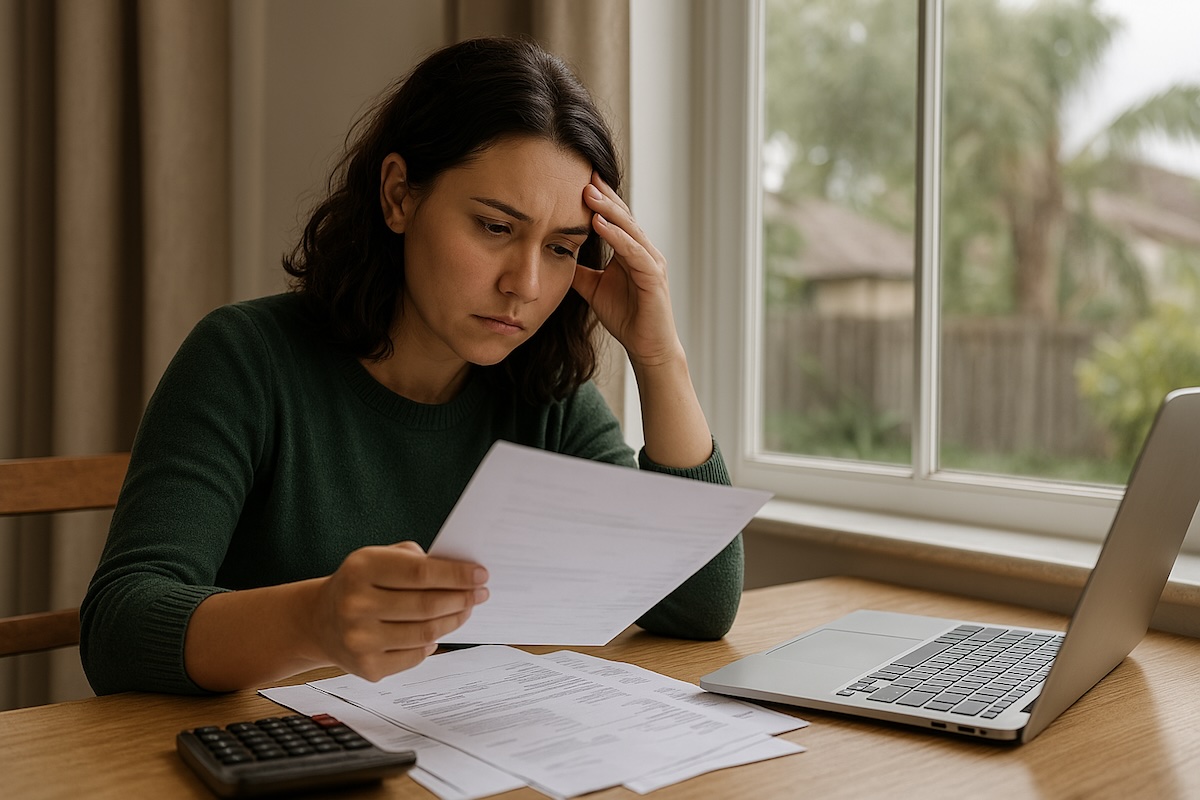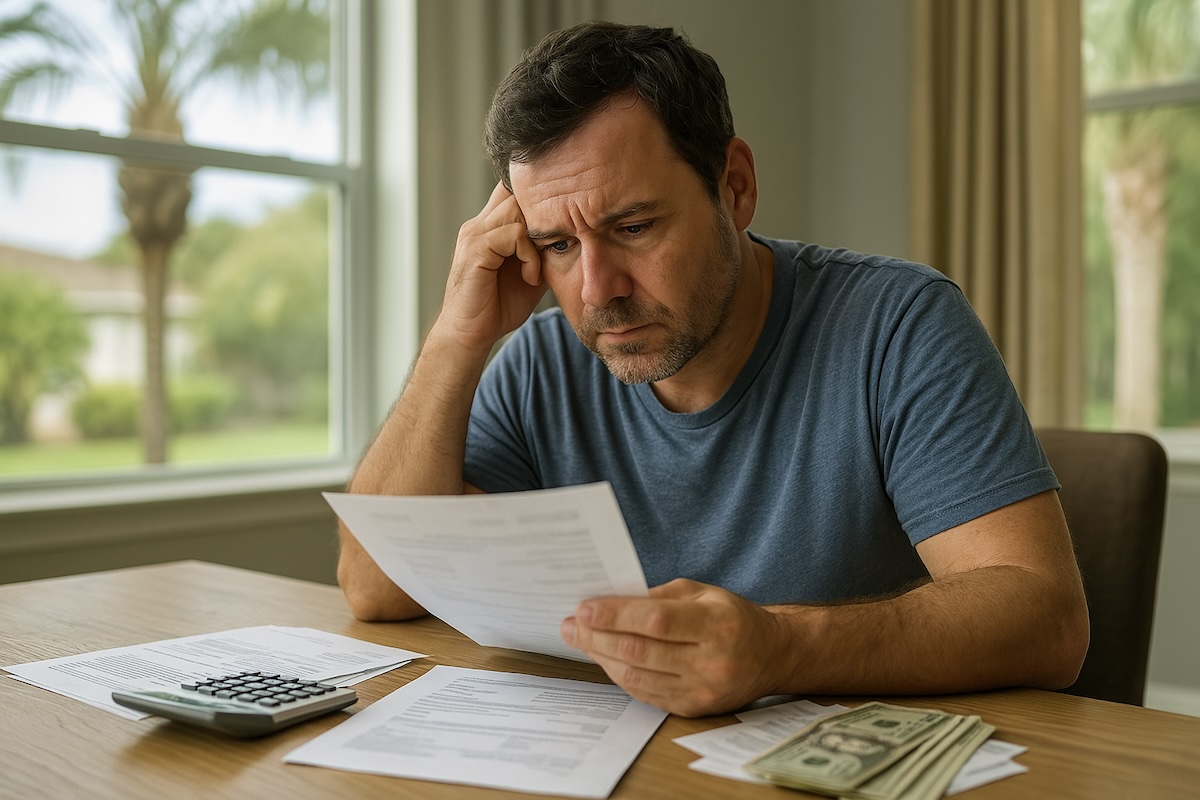With the economy facing new pressures, many Floridians are taking a closer look at their financial situation. Higher living costs, shifts in employment, changes in interest rates, and a possible recession this year have made it more challenging for some households to stay current on their bills.
If you’re feeling overwhelmed, you’re not alone—and you’re not out of options. If you’ve fallen far behind on credit cards, medical expenses, or mortgage payments, it may be worth learning more about how bankruptcy works and whether it could be a useful option in your situation.
Whether or not bankruptcy is the right path for you at the moment, here are some steps you can take now to help stabilize your finances, make more informed decisions, and determine—ideally with guidance from a qualified bankruptcy attorney—whether filing is the right option for you.
15 Practical Tips for Floridians Who are Struggling Financially & Considering Filing Bankruptcy
1. Pause & Prioritize Your Essentials

If money is tight, focus first on covering the basics: housing, utilities, food, and transportation.
If you’re falling behind, it may be necessary to temporarily deprioritize unsecured debts like credit cards and allow them to take a back seat while you explore your options. These can potentially be dealt with through negotiation, bankruptcy, or hardship programs. As always, before making major decisions, consider consulting directly with a qualified financial advisor or bankruptcy lawyer.
2. Avoid Draining Retirement Accounts
Tapping your 401(k) or IRA to pay credit card bills is almost never the best move if you are considering filing bankruptcy.
Retirement accounts are generally protected in bankruptcy, and if you pull the money out, you lose that shield. Talk to a professional before touching retirement funds.
3. Know Your Rights with Debt Collectors
Florida follows the federal Fair Debt Collection Practices Act (FDCPA), which protects you from harassment, threats, or misleading claims by debt collectors. You have the right to request that a collector stop contacting you, and you can ask for verification of any debt. Keep all communication in writing.
4. Keep a Close Eye on Your Credit

Even during a rough patch, keep tabs on your credit reports. You’re entitled to a free credit report from each bureau every year at AnnualCreditReport.com. Errors can make it harder to qualify for relief programs or future loans, so correct any mistakes now.
5. Track Your Income & Spending
It may sound obvious, but listing out exactly what’s coming in and where it’s going can give you clarity. Free tools like Mint or YNAB (You Need a Budget) can help you spot patterns, plug leaks, and make decisions grounded in real numbers—not just stress.
6. Check for Local or State Assistance Programs

Florida has some limited hardship programs for energy bills, rent, or food assistance. United Way’s 211 helpline is a good place to start, or visit myflfamilies.com for programs like SNAP, TANF, or Medicaid if you’ve had a drop in income.
7. Keep Records of Communication
If you’re missing payments, keep all creditor communications. Document everything, including income, bills, and financial hardships. This can help if you apply for hardship programs, debt settlement, or ultimately file bankruptcy.
8. Stop Taking on New Debt
It can be tempting to lean on more credit to stay afloat—but if bankruptcy may be in your future, charging new purchases right before filing can create legal problems. Avoid new debt once you’re seriously considering bankruptcy.
9. Look Into Alternatives—but Be Careful
Non-profit credit counseling agencies may be able to help you with budgeting or debt management plans. But watch out for shady “debt relief” companies that promise to wipe your debt without bankruptcy—they often charge big fees and leave people worse off.
This is different from working with a licensed attorney on a formal debt settlement strategy. Law firms offering this service must follow legal and ethical guidelines—and they can often help negotiate with creditors in a way that is more transparent and enforceable.

If you’re considering any kind of debt resolution, it’s wise to consult with a law firm or legal aid organization before signing up with a for-profit debt relief company.
10. Watch for Utility Shut-Off Protections
Some Florida counties and utility providers have seasonal restrictions or hardship programs that prevent service disconnection, especially for seniors or households with young children. Call your provider and ask about payment plans or protection options.
11. Talk to Your Mortgage Servicer Sooner Than Later

If you’re behind on mortgage payments, open the mail and return their calls—even if you don’t have the money.
Many servicers have forbearance or modification programs, especially in hardship situations. Ignoring them can close off options like loss mitigation or a short sale.
12. Use Community Resources for Basic Needs
Churches, food banks, and local charities can help cover groceries, diapers, hygiene items, and sometimes even rent assistance. In Florida, Feeding America has a statewide network of food pantries searchable by ZIP code.
13. Know What Bankruptcy Can and Can’t Do
If most of your debt is unsecured (credit cards, personal loans, medical bills), bankruptcy may offer significant relief. If your debt is mostly student loans, back taxes, or child support, you may need a different strategy.
14. Don’t Be Ashamed to Explore Bankruptcy

Bankruptcy exists because life happens. Medical emergencies, job loss, and inflation aren’t moral failings—they’re facts of life. These things happen, and they don’t make you a failure.
Filing bankruptcy is a legal tool meant to give everyday people a way to regroup and move forward. While it’s not the right fit for everyone, it is a federally protected process that can provide relief and a chance to rebuild.
Bankruptcy works differently state to state due to property exemptions. In Florida:
- The homestead exemption protects your primary residence if it meets size and ownership duration requirements.
- With Florida’s vehicle exemption you, can protect up to $1,000 of vehicle equity ($2,000 for a married couple filing jointly).
- If you don’t claim the homestead exemption, you may qualify for a “wildcard” exemption of up to $4,000 to protect personal property.
- Retirement accounts and Social Security income are generally protected in full.
Understanding these exemptions helps you see what you might actually risk losing—and for most people, it’s far less than they expect.
15. Don’t Wait Too Long to Get Help

The longer you delay, the fewer options you may have. If your wages are being garnished, your home is at risk, or lawsuits are starting to come in, it’s time to act. A free consultation with a bankruptcy attorney can give you a clearer picture before things spiral.
Talk to a Professional Before Filing Bankruptcy
Bankruptcy is not one-size-fits-all, and the right strategy depends on your goals. Are you trying to save your home? Stop wage garnishment? Eliminate overwhelming credit card debt?
A Florida bankruptcy attorney can help you answer these questions, explain what your outcome would likely be, and offer honest insight on whether it’s your best option—or whether another approach makes more sense.

Even if you’re just starting to explore your options, getting clear information now can help you avoid bigger problems later. Some attorneys offer free consultations, so you don’t need to commit to anything to get the facts.
The Independence Law Firm
Whether you ultimately file or not, taking time to understand how bankruptcy works in Florida can help you make informed decisions and regain a sense of control. If you’re unsure what comes next, don’t hesitate to reach out to a bankruptcy lawyer who can guide you through it. You deserve clear answers, honest advice, and a way forward.
If you are a Florida resident considering filing bankruptcy, contact The Independence Law Firm of Winter Park, FL. Call (813) 642-4863 or click here to book an in-person or Zoom meeting online.
Disclaimer: The information presented in this article and across this website is presented for general educational purposes only. Although this article discusses legal issues, it is not legal advice. Please be aware that laws and the content of any linked websites or pages might have evolved since the publication of this article, and as such, we cannot guarantee the ongoing accuracy of any presented information. Utilizing this article does not establish an attorney-client relationship.

